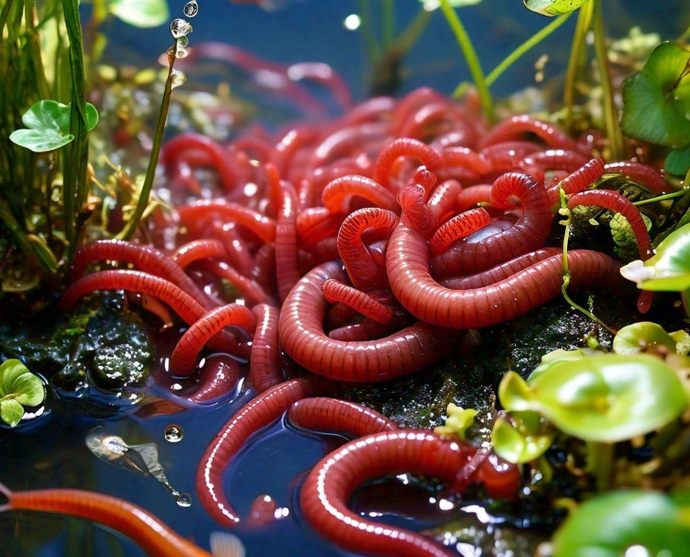Healthy red wigglers: For sustainable composting
Why Red Wigglers Are Important for Natural Farming
Red wigglers play an essential role in natural farming, largely via their distinct capacity to disintegrate organic products and enhance dirt wellness. The degree of their effect on farming methods and soil biology raises intriguing inquiries regarding the future of organic farming.
Role of Red Wigglers in Soil Health

In addition, red wigglers enhance soil framework by creating channels as they burrow. These networks enhance aeration and water seepage, promoting a healthier root atmosphere. Their task also helps in keeping optimum dampness degrees, which is important for healthy plant development.

Benefits of Worm Castings
Worm castings, the nutrient-rich excrement produced by red wigglers, offer as an effective change for natural farming. These spreadings are replete with necessary nutrients such as nitrogen, phosphorus, and potassium, which are important for plant growth. Unlike artificial fertilizers, worm spreadings launch nutrients gradually, offering a steady supply over time and minimizing the danger of nutrient leaching and drainage.
Furthermore, worm spreadings improve dirt structure and aeration, advertising healthier root systems. Their high organic issue content enhances wetness retention, making it possible for plants to much better withstand drought problems. In addition, worm castings have valuable microbes that support plant wellness by subduing pathogens and enhancing nutrient uptake.
The application of worm spreadings can result in increased crop returns and boosted high quality of produce, making them a very useful resource for natural farmers. Their usage additionally straightens with sustainable farming techniques, contributing to soil fertility without the adverse ecological impacts associated with chemical plant foods. In general, the incorporation of worm castings into farming practices fosters an extra resistant and efficient community, highlighting the value of red wigglers in chemical-free farming systems.

Enhancing Nutrient Biking
(red wiggler earthworms for sale)Nutrition biking is a critical procedure in natural farming, and the assimilation of red wigglers plays a critical function in enhancing this cycle. As red wigglers consume rotting natural issue, they eliminate nutrient-rich spreadings, which are teeming with useful microorganisms.
In addition, red resource wigglers assist to speed up the mineralization of nutrients, converting them from inert types into bioavailable forms that plants can take in. This procedure is important for preserving dirt fertility and promoting healthy crop development. The existence of red wigglers also urges a varied dirt ecological community, promoting a balance of nutrients that supports different plant varieties.
Improving Soil Framework
The improvement of dirt framework is vital for promoting a healthy and balanced agricultural ecological community, and the task of red wigglers significantly adds to this improvement. These earthworms play an important role in freshening the dirt and creating a network of networks that facilitate water seepage and origin penetration. As they delve through the soil, red wigglers break up compacted layers, allowing for far better oxygen exchange and advertising microbial task.
Additionally, the organic issue produced from their waste, understood as vermicast, boosts soil aggregation. This procedure produces secure clumps of dirt fragments, boosting dirt porosity and reducing disintegration (red wigglers). The presence of red wigglers likewise encourages the growth of helpful fungal networks, which are critical for nutrient uptake by plants
Promoting Lasting Practices
Integrating red wigglers right into natural farming practices not only improves dirt health but likewise promotes lasting agricultural techniques. These earthworms play a vital role in vitamins and mineral cycling, changing natural waste into valuable garden compost that improves the dirt. By using red wigglers, farmers can effectively minimize dependence on synthetic fertilizers, therefore decreasing chemical drainage and its detrimental results on ecosystems.
Furthermore, the unification of red wigglers motivates the technique of reusing natural materials, such as kitchen area scraps and farm waste. This waste reduction method not just lowers disposal expenses yet also cultivates a closed-loop system where nutrients are continuously gone back to the soil (red wigglers). Such methods are crucial in reducing environment adjustment, as they improve carbon sequestration and lower greenhouse gas emissions
Additionally, red wigglers boost water retention in the soil, which is essential in times of dry spell. Their burrowing tasks create channels that allow water to permeate much deeper right into the ground, therefore promoting effective water usage. Ultimately, integrating red wigglers right into chemical-free farming not just supports biodiversity but likewise straightens with the principles of lasting agriculture, using an alternative method to food manufacturing.
Conclusion
In conclusion, red wigglers play a critical function in chemical-free farming by substantially enhancing soil health and wellness and fertility. Their capability to break down raw material and create nutrient-rich castings cultivates a successful microbial area, which is necessary for vitamins and mineral cycling. Furthermore, the tunneling activities of these worms enhance dirt framework and aeration, promoting much better water infiltration and origin development. Therefore, the assimilation of red wigglers into farming practices is important for advertising sustainability and enhancing overall dirt high quality.